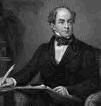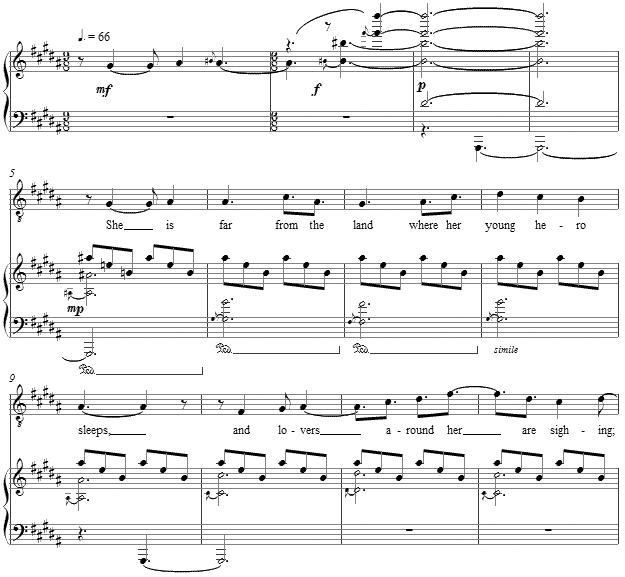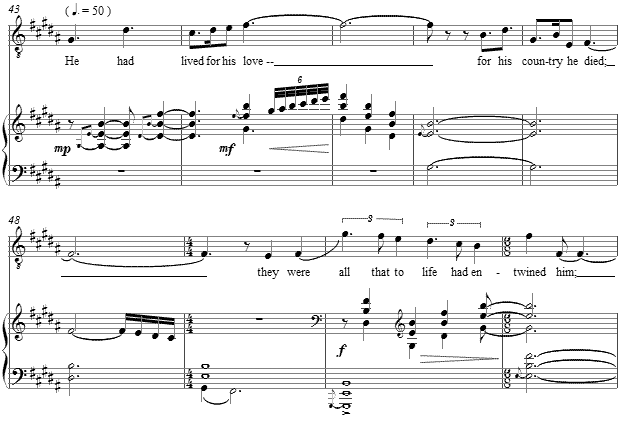Music and Texts of GARY BACHLUND Vocal Music | Piano | Organ | Chamber Music | Orchestral | Articles and Commentary | Poems and Stories | Miscellany | FAQs |
The Broken Heart - (2004)
Thomas Moore
for tenor and piano
for Tom Booth, a fine tenor and colleague
She is far from the land where her young hero sleeps,
And lovers around her a sighing;
But coldly she turns from their gaze and weeps,
For her heart in his grave is lying.
He had lived for his love - for his country he died;
They were all that to life had entwined him;
Nor soon shall the tears of his country be dried,
Nor long will his love stay behind him!
O, make her a grave where the sunbeams rest,
When they promise a glorious morrow;
They'll shine o'er her sleep like a smile from the west,
From her own loved island of sorrow![ 5 pages, circa 3'15" ]
Thomas Moore
Thomas Moore (1779-1852) was an Irish poet, friend of Lord Byron and P. B. Shelley. Moore's writings range from lyric to satire, from prose romance to history and biography. His popular Irish Melodies appeared in ten parts between 1807 and 1835. Moore was a good musician and skillful writer of songs, which he set to Irish tunes, mainly of the 18th century. Moore was born in Dublin as the son of a grocer. His background was poor and he never varnished it. In his poem 'Epitaph on a Tuft-Hunter' he mocked snobbery:
"Heaven grant him now some noble nook
For, rest his soul! he'd rather be
Genteelly damn'd beside a Duke,
Than sav'd in vulgar company."
Moore studied at Trinity College, Dublin and London, and published his first book, The Poetical Works of Thomas Little, in 1801. He became in 1803 a civil officer to Bermuda, where he stayed for a year, and then returned to England after travels in the U.S. and Canada. His Epistles, Odes and Other Poems, taken from his journeys, appeared in 1806. It criticized Americans and and also arose moral irritation. However, his songs, based on folk tunes, became very popular and gained sympathy for the Irish nationalists. Best known of them are perhaps "The Last Rose of Summer" and "Believe Me, If All Those Endearing Young Charms."
In the 1810s Moore was considered as important writer as Byron and Sir Walter Scott. In 1819 Moore was condemned to imprisonment because of debts - his deputy in Bermuda misappropriated £6000, and the responsibility fell on Moore himself. He left England with Lord John Russell for a visit to Italy and stayed away until the debt to the Admiralty had been paid, returning in 1822. In the next year his Loves of the Angels became notorious for its eroticism but was financially successful.
In 1824 Moore received Byron's memoirs, but according to some sources, he burned them with the publisher John Murray, presumably to protect his friend. On the other hand, Leslie Marchand claims in his biography, that Moore tried to prevent Murray from burning the memoirs, and he actually tried to retrieve the pages from the fire. Later Moore used some material from Byron's manuscript and brought out the Letters and Journals of Lord Byron (1830). In 1835 Moore was awarded a literary pension. In the same year he published The Fudges in England. It was a light satire on an Irish priest turned Protestant evangelist and on the literary absurdities of the day. Moore remained a popular writer for the rest of his life. He was awarded a Civil List pension in1850. Moore died on February 25, 1852 in Wiltshire. He is still Ireland's national poet.
A gentle single voice begins, broadening out into wide spaced octaves suggesting distance and separation. The vocal line rests on a G sharp minor tonality at the beginning in which an insistent A sharp and E natural irritate with dissonance and repetition.
The seeming strophes of the setting are broken by an interlude at measure 22 and again at measure 43, after which the strophic nature of the opening musical gesture never again returns. The song setting ends in a gentle, accompanied recitative as the explanation for this sad tale and earnest prayer for the lost lovers follow the exposition of this scene of separation and "the broken heart."
Tom Booth
Tenor Thomas Booth sang for nine seasons with the Metropolitan Opera as a principal solo artist after studying at the Juilliard School in New York and The Opera School of Chicago. He has performed worldwide as a leading tenor with Operas Companies and with Symphony Orchestras including the Stockholm Royal Philharmonic, The Jerusalem Symphony, The New World Symphony, The Dallas Symphony, The Warsaw Philharmonic, toured with the Mantovani Orchestra and The New Sigmund Romberg Orchestra, The National Symphony Orchestra at The Kennedy Center, The London Philharmonia Orchestra, The New York City Opera, The Frankfurt Opera, The San Diego Opera, Opera de Nice in France. He has recorded for Erato Disques, Albany Records UK and for Decca/Argo Records. Tom is also an accomplished organist.
The score for The Broken Heart is available as a free PDF download, though any major commercial performance or recording of the work is prohibited without prior arrangement with the composer. Click on the graphic below for this piano-vocal score.



